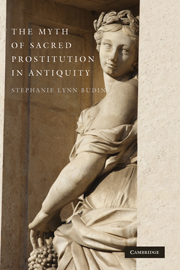Book contents
- Frontmatter
- Contents
- Acknowledgments
- Abbreviations
- THE MYTH OF SACRED PROSTITUTION IN ANTIQUITY
- 1 Introduction
- 2 The Ancient Near Eastern Data
- 3 The So-Called “Evidence”
- 4 Herodotos
- 5 In the Footsteps of Herodotos: Lucian and “Jeremiah”
- 6 Pindar Fragment 122
- 7 Strabo, Confused and Misunderstood
- 8 Klearkhos, Justinus, and Valerius Maximus
- 9 Archaeological “Evidence” from Italy
- 10 The Early Christian Rhetoric
- 11 Last Myths
- Bibliography
- Index
- Index Locorum
7 - Strabo, Confused and Misunderstood
Published online by Cambridge University Press: 18 August 2009
- Frontmatter
- Contents
- Acknowledgments
- Abbreviations
- THE MYTH OF SACRED PROSTITUTION IN ANTIQUITY
- 1 Introduction
- 2 The Ancient Near Eastern Data
- 3 The So-Called “Evidence”
- 4 Herodotos
- 5 In the Footsteps of Herodotos: Lucian and “Jeremiah”
- 6 Pindar Fragment 122
- 7 Strabo, Confused and Misunderstood
- 8 Klearkhos, Justinus, and Valerius Maximus
- 9 Archaeological “Evidence” from Italy
- 10 The Early Christian Rhetoric
- 11 Last Myths
- Bibliography
- Index
- Index Locorum
Summary
A full 25% of our classical sources for sacred prostitution, both implied and inferred, come from Strabo (see Chapter 3). According to the Geography written by this first-century polymath from Asia Minor, sacred prostitution was supposedly practiced in Babylon, Corinth, Pontic Comana, Eryx, Egyptian Thebes, and Armenia. In fact, if one were to maintain Oden's hypothesis of sacred prostitution as accusation, Strabo, even more so than Herodotos, would be our primary accusational culprit.
And yet a closer look at Strabo's data reveal that he was no more writing about sacred prostitution than was Pindar. The only place where Strabo appears to be discussing this so-called practice is in his Babylonian logos, much of which he takes from Herodotos. Strabo does not function as independent, corroborating evidence for Herodotos in this case; rather, the Roman-age geographer merely repeats second or third hand what had been passed down to him in apparently garbled fashion. Strabo appears to be confused about Babylonian sacred prostitution, and his description, as we shall see, betrays his mistrust of the evidence.
In all other instances, it is the modern audience that is confused. Aspects of Strabo's working vocabulary have become confounded over the millennia so that terms that bear no relation to sacred prostitution have come to be translated as “sacred prostitute.” This vocabulary – such as hierodule, pallakis, and even kataporneuô – will be reconsidered and ultimately redefined below.
- Type
- Chapter
- Information
- The Myth of Sacred Prostitution in Antiquity , pp. 153 - 209Publisher: Cambridge University PressPrint publication year: 2008



